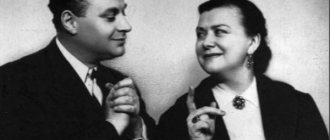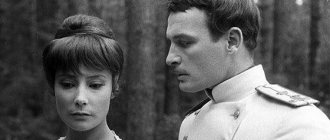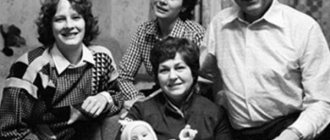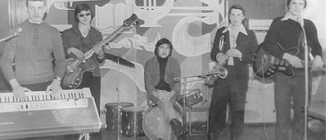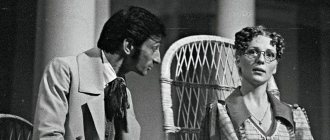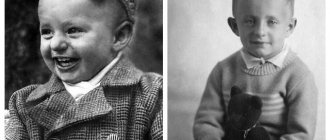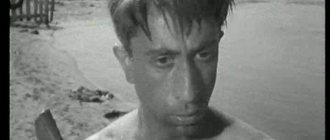| Alexandra Markovna Rozovskaya | |
| Birth name: | Alexandra Markovna Rozovskaya |
| Date of Birth: | January 27, 1988(1988-01-27) (age 32) |
| Place of Birth: | Moscow |
| Profession: | Actress |
| Citizenship: | Russia, Russia |
| Theater: | Russian Academic Youth Theater |
Alexandra Markovna Rozovskaya
(born January 27, 1988) is a Russian theater actress.
Biography
Born into the family of the famous Russian theater figure Mark Grigorievich Rozovsky. Studied at music school No. 2 named after. I. Dunaevsky and at the Moscow Theater of Young Actor. She first appeared on stage at the age of 4 in the performances “ Hunting for Rhinoceroses”
" and "
Gambrinus
". At the age of 13, she began playing in the musical “Nord-Ost” (role: Katya Tatarinova), which became her first serious performance.
On October 23, 2002, Alexandra was in the rehearsal hall of the House of Culture of the Moscow Bearing OJSC when the building was captured by Chechen militants. Alexandra was not injured, but her cousin Arseny Kurylenko (he played Sanya Grigoriev as a child) and friend Kristina Kurbatova (she was Alexandra’s replacement) were killed.[1] In 2012, recalling the terrorist attack, Alexandra stated that after an antidote injection in her neck, she could not turn her head for two months[2].
After the terrorist attack, Alexandra, being mentally traumatized, did not perform in the theater and did not want to become an actress either, intending instead to enter the journalism department to become a journalist[2]. But just before admission, she watched the play “ The Madwoman of Chaillot
", after which she changed her mind and entered RATI-GITIS on the course of Alexei Borodin (despite the fact that she had to withstand a very tough competition - 1100 people per place), which she graduated in 2009 with honors and was accepted in the same year to the RAMT troupe.
Together with the troupe of the play “Life Everywhere” she was awarded an award at the International Theater Festival “ACADEMIA”.[3]
Childhood and youth
The future playwright was born in the spring of 1937. After graduation, my parents, young civil engineers, were sent to the Far East, to Petropavlovsk-Kamchatsky, to build a ship repair plant. There the firstborn was born.
Playwright Mark Rozovsky
Mark Grigorievich’s father, Semyon Shlindman, was arrested on charges of counter-revolutionary activities when his son was not even a year old, so Mark Rozovsky did not have time to remember his parent. Shlindman was rehabilitated after the death of Joseph Stalin. He spent 18 years in the northern camps.
Having heard about the arrest of his son-in-law, little Mark was taken to Moscow by his grandmother. Soon my mother also moved to the capital. The woman remarried her colleague Grigory Rozovsky. Later, Mark Rozovsky said that it was a formal marriage of convenience, because my mother continued to love my father until the end of her life. The stepfather adopted the boy: the director bears his middle and last name.
Mark Rozovsky
The Jewish blood of his father and the Russian-Greek blood of his mother flows in Rozovsky’s veins. The grandmother who took her grandson to the capital was Russian, and the grandfather was Greek.
In the mid-1950s, Rozovsky was awarded a matriculation certificate, and he headed to the country's main university, Moscow State University, choosing journalism. He received his diploma in 1960 and immediately entered screenwriting courses. Four years later, in 1964, he became a certified screenwriter and director.
Roles in the theater
RAMT
- 1989 - “The Adventures of Tom Sawyer” by Twain. Director: D. Cranney - Gracie Miller
- 2006 - “Cinderella” by Evgeny Schwartz. Director: Alexey Borodin - Cinderella
- 2007 — “The Shore of Utopia.” Part 3. Washed ashore. Director: Alexey Borodin - Maid
- 2010 - “The Adventures of Captain Vrungel.” Director: Boris Granatov - Reporters, port employees, aborigines
- 2010 - “Scarlet Sails” by Green. Director: Alexey Borodin - Assol
- 2010 - “FSK-16” Kristo Shagor. Director: Yana Lisovskaya - Kirsten
[4] - 2010 - “Chekhov-GALA” based on one-act plays by Chekhov. Director: Alexey Borodin - 3rd young lady (“Wedding”)
- 2011 - “Rock and Roll” by T Stoppard. Director: Adolph Shapiro - Gillian
- 2011 - “Don Quixote” based on the play by E. Schwartz. Director: Yu. Eremin - Antonia, niece
- 2012 - “The Miser” based on the comedy by J-B Molière. Director (Egor Peregudov) - Eliza, daughter of Harpagon
Project by Egor Druzhinin
- 2011 — “Life Everywhere”
La' Theater
- 2011 - “The Cherry Orchard” by A.P. Chekhov. Director: Vadim Dubrovitsky - Anya
Notes
- [www.vesti7.ru/archive/news?id=1488 Vesti Nedeli: Children hostages played words and calmed adults]
- ↑ 12
[blogs.mail.ru/mail/vznakprotesta/623BE1F824A36CA0.html Every year on the night of October 25-26, Sasha dreams of Nord-Ost…..] (Russian). Retrieved October 26, 2012. [www.webcitation.org/6CjiNZOPS Archived from the original on December 7, 2012]. - [www.academiafest.ru/ru/main], ACADEMY - III International Theater Festival.
- [www.itogi.ru/arts-teatr/2010/9/149566.html No. 09 (716) / Art and culture / Art diary / Theater / Entrance/exit]
Notes[edit | edit code]
- News of the Week: Children-hostages played with words and calmed down adults (unspecified)
(inaccessible link). Retrieved August 11, 2010. Archived January 10, 2011. - ↑ 12
Every year on the night of October 25-26, Sasha dreams of Nord-Ost..... (Russian). Retrieved October 26, 2012. - [1] Archival copy dated July 2, 2012 on the Wayback Machine, ACADEMY - III International Theater Festival.
- No. 09 (716) / Art and culture / Art diary / Theater / Entrance/exit
Links
- [www.ramt.ru/people/?content=item&item=672&type=5 Actress’s page on the RAMT website]
- [www.vzhizn.ru/ Project by Yegor Druzhinin “Life Everywhere”]
- [www.ramt.ru/news/?content=item&item=1330 RAMT - Alexandra Rozovskaya on the “Culture” TV channel]. ramt.ru. Retrieved September 25, 2010. [www.webcitation.org/67RwDubXa Archived from the original on May 6, 2012].
| : Incorrect or missing image | To improve this article it is desirable:
|
Excerpt characterizing Rozovskaya, Alexandra Markovna
On the stage there were even boards in the middle, painted paintings depicting trees stood on the sides, and a canvas on boards was stretched behind. In the middle of the stage sat girls in red bodices and white skirts. One, very fat, in a white silk dress, sat separately on a low bench, to which green cardboard was glued to the back. They were all singing something. When they finished their song, the girl in white approached the prompter's booth, and a man in tight-fitting silk trousers on thick legs, with a feather and a dagger, approached her and began to sing and spread his arms. The man in tight trousers sang alone, then she sang. Then both fell silent, the music began to play, and the man began to finger the hand of the girl in a white dress, apparently again waiting for the beat to begin his part with her. They sang together, and everyone in the theater began to clap and shout, and the man and woman on stage, who were portraying lovers, began to bow, smiling and spreading their arms. After the village and in the serious mood in which Natasha was, all this was wild and surprising to her. She could not follow the progress of the opera, could not even hear the music: she saw only painted cardboard and strangely dressed men and women, moving, speaking and singing strangely in the bright light; she knew what all this was supposed to represent, but it was all so pretentiously false and unnatural that she felt either ashamed of the actors or funny at them. She looked around her, at the faces of the spectators, looking for in them the same feeling of ridicule and bewilderment that was in her; but all the faces were attentive to what was happening on the stage and expressed feigned, as it seemed to Natasha, admiration. “This must be so necessary!” thought Natasha. She alternately looked back at those rows of pomaded heads in the stalls, then at the naked women in the boxes, especially at her neighbor Helen, who, completely undressed, with a quiet and calm smile, without taking her eyes off, looked at the stage, feeling the bright light poured throughout the hall and warm, crowd-warmed air. Natasha little by little began to reach a state of intoxication that she had not experienced for a long time. She didn’t remember what she was, where she was, or what was happening in front of her. She looked and thought, and the strangest thoughts suddenly, without connection, flashed through her head. Either the thought came to her to jump onto the ramp and sing the aria that the actress sang, then she wanted to hook the old man sitting not far from her with her fan, then she wanted to lean over to Helen and tickle her. One minute, when everything was quiet on the stage, waiting for the start of the aria, the entrance door of the stalls creaked, on the side where the Rostovs’ box was, and the steps of a belated man sounded. “Here he is Kuragin!” Shinshin whispered. Countess Bezukhova turned to the newcomer, smiling. Natasha looked in the direction of Countess Bezukhova’s eyes and saw an unusually handsome adjutant, with a self-confident and at the same time courteous appearance approaching their bed. It was Anatol Kuragin, whom she had seen for a long time and noticed at the St. Petersburg ball. He was now in an adjutant uniform with one epaulette and a bracelet. He walked with a restrained, dashing gait, which would have been funny if he had not been so handsome and if there had not been such an expression of good-natured contentment and joy on his beautiful face. Despite the fact that the action was going on, he, slowly and slightly rattling his spurs and saber, smoothly and high holding his perfumed beautiful head, walked along the carpet of the corridor. Looking at Natasha, he walked up to his sister, put his gloved hand on the edge of her box, shook her head and leaned over and asked something, pointing at Natasha. - Mais charmante! [Very sweet!] - he said, obviously about Natasha, as she not so much heard as understood from the movement of his lips. Then he walked to the front row and sat down next to Dolokhov, giving a friendly and casual elbow to Dolokhov, whom the others were treating so ingratiatingly. He smiled at him with a cheerful wink and rested his foot on the ramp. – How similar brother and sister are! - said the count. - And how good they are both! Shinshin began to tell the count in a low voice some story of Kuragin's intrigue in Moscow, to which Natasha listened precisely because he said charmante about it. The first act ended, everyone in the stalls stood up, got confused and began to walk in and out. Boris came to the Rostovs' box, very simply accepted congratulations and, raising his eyebrows, with an absent-minded smile, conveyed to Natasha and Sonya his bride's request that they be at her wedding, and left. Natasha talked to him with a cheerful and flirtatious smile and congratulated the same Boris with whom she had been in love before on his marriage. In the state of intoxication in which she was, everything seemed simple and natural.
Theater
The creative biography of the screenwriter and director began in 1958: 21-year-old Mark Rozovsky headed the student theater organized at Moscow State University and called “Our House”. Mark Grigorievich worked as the artistic director of Our House for 10 years: in 1969, the too bold repertoire of the youth theater was not liked by cultural officials, and it was closed, despite its popularity.
Playwright Mark Rozovsky
At Our House, the young artistic director directed the production “The Whole Evening, Like Damned Ones” - the first performance in the USSR of the absurdist direction. The performance was awarded the prize of the All-Union Festival of Student Theaters and was awarded the main award of the festival in Warsaw. But prizes and awards did not save the theater from closure.
In 1970, Mark Rozovsky created a new theater at the capital's Literary Museum. After 4 years, he became the chief director of the Moscow music hall and at the same time directed productions for the Theater. V. Mayakovsky, Moscow Art Theater and BDT.
Mark Rozovsky on stage
Ebullient creative energy was overflowing in Rozovsky: the director managed to delight theatergoers in Moscow and the northern capital. In the city on the Neva, he staged performances at the Mariinsky Theater, the Theater named after. Lensovet. Mark Rozovsky was also invited to direct productions on the stage of theaters in Riga and Wroclaw.
In 1983, with the light hand of Mark Grigorievich, a new theater appeared in Moscow, called “At the Nikitsky Gate”. On its stage, the talented director staged performances based on the works of Mikhail Zoshchenko, Isaac Babel, and Nikolai Karamzin. There were also performances of Rozovsky's plays on stage.
Performance by Mark Rozovsky “Doctor Chekhov”
Sophisticated Moscow theatergoers remember the brilliant performances “Doctor Chekhov”, “Romances with Oblomov”, “Mein Kampf”. And the musical and dramatic productions “Songs of our yard” and “Songs of our communal apartment” became the hallmark of the theater.
Mark Rozovsky's plays "Red Corner", "Triumphal Square", "Red Corner" were staged on stages in the Soviet Union and Europe. The play “Kafka. Father and Son" was seen by the audience of the New York theater "La Mama", and "Red Corner" was staged on the stage in Dusseldorf and Bonn.
Performance by Mark Rozovsky “The History of a Horse”
Mark Rozovsky was one of the first in the USSR to start staging musicals. Thanks to him, in the mid-1970s, Soviet audiences saw the rock opera Orpheus and Eurydice. In the same year, he staged “The Story of a Horse” on the stage of the Bolshoi Drama Theater. Later, the musical was taken into the repertoires of theaters in Broadway, London and Stockholm.
In 2020, in collaboration with Yuri Ryashentsev, Mark Rozovsky staged a musical based on the novel “Dear Friend” by Guy de Maupassant.
